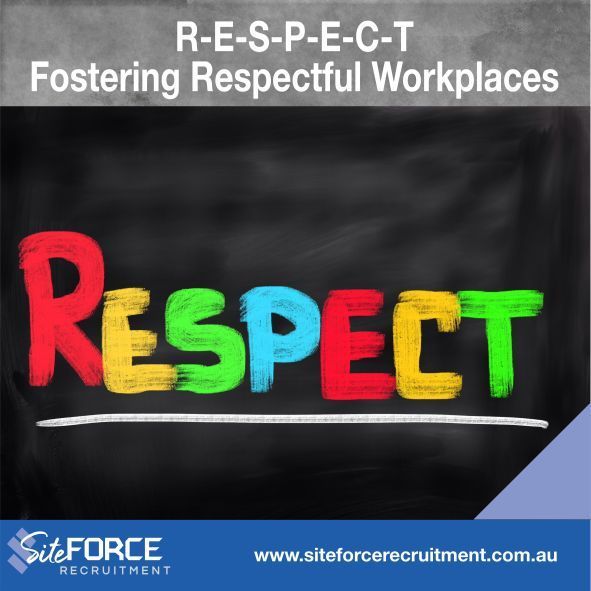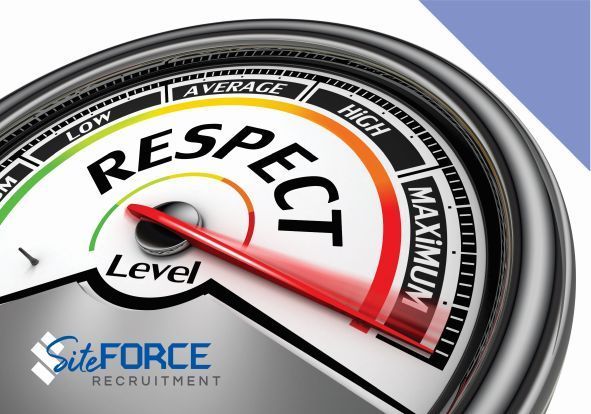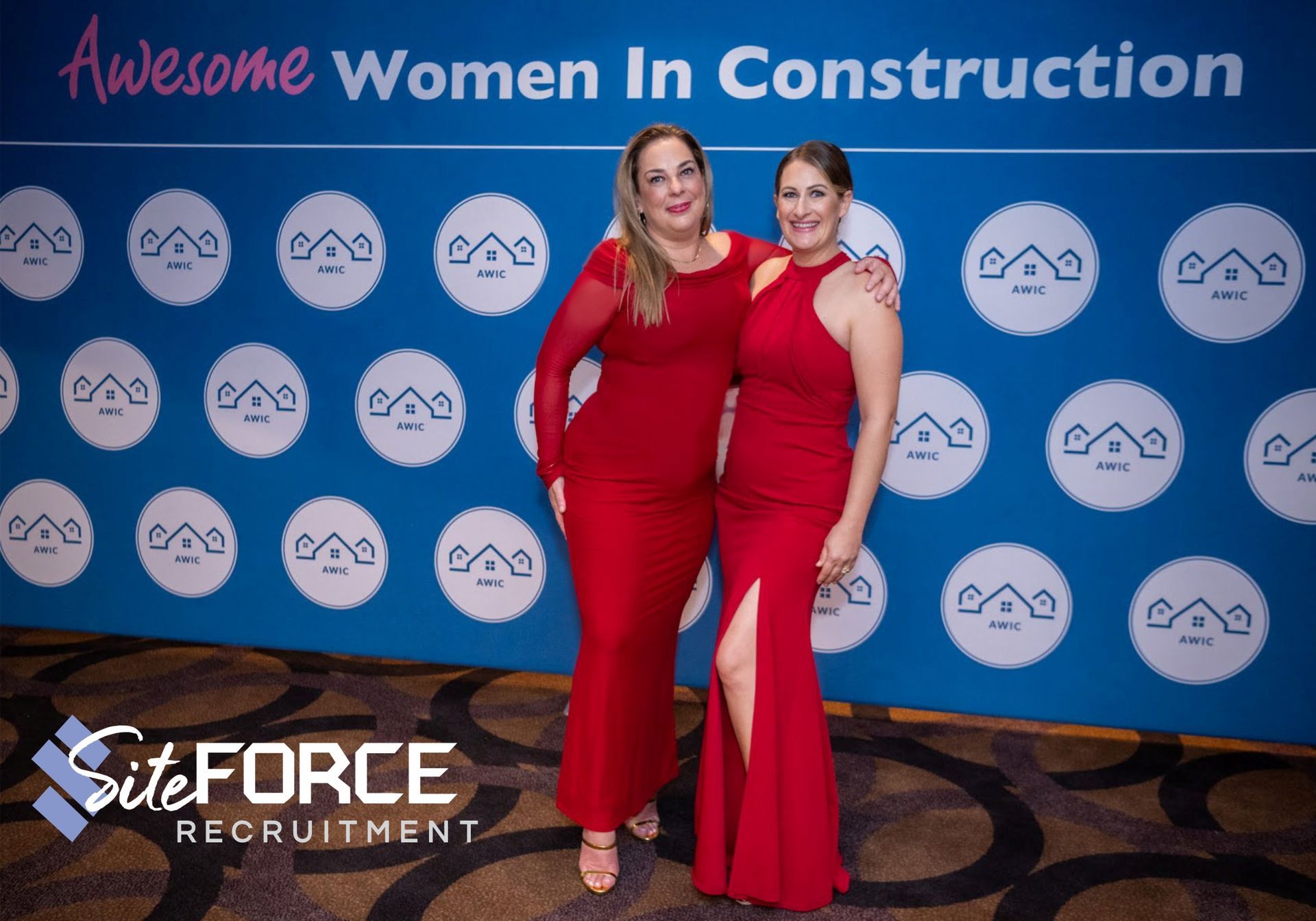R-E-S-P-E-C-T
Fostering Respectful Workplaces

Do you all hear Aretha Franklin singing R-E-S-P-E-C-T when you saw the title of this article? The second line in the chorus to that timeless 1960’s song is “find out what it means to me” and it’s really clear these days that construction and building industry is finding out what ‘RESPECT’ means these days.
I love my staff. Between us, we’ve developed a high level of mutual trust, loyalty and respect. So when I allocate staff to sites and organisations, I want the same for them in that environment. It is also now mandatory, with the implementation of the new federal legislation this year that employers manage psychosocial hazards under the Work Health and Safety Act (WHS Act).
And out there in the bustling world of construction, where steel meets sweat and structures rise from the ground, the importance of a positive and respectful workplace culture cannot be overstated. Unfortunately, like any industry, construction is not immune to psychosocial hazards stemming from disrespectful behaviour. Insults, derogatory language, and aggression are three common behaviours that create a toxic environment that not only undermines morale but also poses significant psychosocial risks for all involved. In this article, we'll delve into the psychosocial hazards associated with some common bad behaviour on construction sites, explore specific challenges, and outline five steps to foster a culture of r-e-s-p-e-c-t.
Understanding the Psychosocial Impact of 3 Common Bad Behaviours
You just shouldn’t treat people like this to begin with in my opinion, and truth be told, my team end up telling me they just don’t want to work on sites or for managers that display these three types of common behaviour listed below. You want great workers that are highly productive and buy into giving their best for your success and profitability, then make sure this isn’t part of your culture:-
1. Insulting Behaviour:
Insults on a construction site can create an atmosphere of tension and hostility. Such behaviour can lead to heightened stress levels, damaged self-esteem, and strained interpersonal relationships. Over time, persistent insults can contribute to a toxic psychosocial environment, negatively impacting mental well-being and job satisfaction.
2. Derogatory Language ("Pussy"):
Using derogatory language, such as calling someone a 'pussy,' not only perpetuates a culture of sexism but also inflicts psychological harm. It can create feelings of humiliation, erode self-confidence, and contribute to a hostile work environment. Addressing such language is crucial for fostering a workplace that values diversity and ensures the psychological well-being of all employees.
3. Swearing and Aggression:
Excessive swearing and aggressive behaviour can have profound psychosocial effects on construction site workers. It contributes to heightened stress levels, creates a culture of fear, and negatively impacts mental health. The constant exposure to aggression can lead to increased anxiety, reduced job satisfaction, and a diminished sense of safety in the workplace.
A 5-Step Approach to Deal with Disrespect
1. Promote Open Communication:
Encourage an environment where team members feel safe to express concerns without fear of reprisal (“you bunch of pussies” has no place in any environment). Establish clear communication channels, such as anonymous reporting systems, to address disrespectful behaviour promptly. Open dialogue fosters trust and enables the identification of potential psychosocial hazards.
2. Educate on Respectful Language and Behaviour:
Conduct regular training sessions on the importance of respectful language and behaviour. Equip leaders, managers, mentors and workers with the tools to recognise and address disrespectful conduct. Highlight the psychosocial impact of such behaviour, emphasising that fostering a positive workplace culture is a collective responsibility. Start at the top and ensure the owners, leaders and managers are all on board, and if it requires a change in behaviour, support each other to make the change.
3. Implement a Zero-Tolerance Policy:
Clearly communicate a zero-tolerance policy for insulting behaviour, derogatory language, and aggression. Outline the consequences of violating this policy, emphasising that creating a safe and respectful work environment is a non-negotiable priority for the organisation.
4. Provide Support Mechanisms:
Recognise that employees may need support when dealing with disrespectful behaviour. Implement counselling services, employee assistance programs, or mentorship initiatives to help individuals cope with psychosocial challenges. A supportive workplace culture reinforces the importance of mental well-being.
5. Establish Intervention Protocols:
Define clear intervention protocols for situations where disrespectful behaviour persists. Empower team leaders and supervisors to address issues promptly. Establish a chain of command for reporting and addressing incidents, ensuring a swift and effective response to psychosocial hazards.
Building a Foundation of Respect
In the construction industry, where collaboration and teamwork are essential, fostering a culture of respect is not just a matter of etiquette; it's a fundamental aspect of creating a safe and healthy work environment. By addressing psychosocial hazards associated with disrespectful behaviour head-on, organisations can build a foundation where individuals feel valued, supported, and psychologically secure. It's a collective responsibility that, when undertaken with dedication, ensures that construction sites become not only places of hard work but also communities where individuals thrive both professionally and personally.
Over to you Aretha….
R-E-S-P-E-C-T
Find out what it means to me
R-E-S-P-E-C-T
Take care, TCB*
Oh (sock it to me, sock it to me
Sock it to me, sock it to me)
A little respect (sock it to me, sock it to me
Sock it to me, sock it to me)
Whoa, babe (just a little bit)
A little respect (just a little bit)
(*taking care of business)
Our Superpower
Our leading 'superpower' is attracting and retaining quality team members who share our values of honesty, integrity, diligence, and service, allowing us to deploy quality team members on client sites quickly.
Our team member's superpower is being motivated, prepared and ready to enthusiastically contribute to the projects at hand, more than just a pair of hands.
Related articles:
Read other informative articles for both employers and workers at: https://www.siteforcerecruitment.com.au/blogs
Chantal Penny is the Director with Superpowers of SiteForce Recruitment. A thought leader in the industry, Chantal, based on her expertise and industry perspective, offers unique guidance, inspiration, and influence in the industry. Chantal Penny is also a thought leader in the industry with her Podcast, Talent Instinct, which is available at:
https://talentinstinctpodcast.libsyn.com/site
At SiteForce Recruitment, we specialise in labour-hire and permanent recruitment in the construction industry. We are committed to valuing people, safety and wellbeing, collaboration, trust and, of course – results!
CONNECT with us via our contact page or bookings links on our website if you are looking to recruit for, get your dream job, or join our amazing labour force team.











